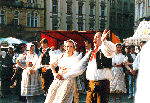|

Dvorák
 Smetana
Smetana
|
Bohemia (nowadays Czech Republic)
Smetana ,
a composer who participated in the Czech failed rebellion against the Austro-Hungarian
Empire that ruled Bohemia, began writing music
which was affected by Czech folk music. His
best-known work is the cycle of six symphonic poems ,
a composer who participated in the Czech failed rebellion against the Austro-Hungarian
Empire that ruled Bohemia, began writing music
which was affected by Czech folk music. His
best-known work is the cycle of six symphonic poems called "My country" (Ma vlast),
and especially the poem "The Moldau"
called "My country" (Ma vlast),
and especially the poem "The Moldau"  (Vltava), about the Vlatva River, in which
he paints his land in fascinating symphonic colors, combined with evident
popular elements. His opera "the Bartered Bride"
incorporates elements of Czech country music as well.
(Vltava), about the Vlatva River, in which
he paints his land in fascinating symphonic colors, combined with evident
popular elements. His opera "the Bartered Bride"
incorporates elements of Czech country music as well.
 Just
below a castle in the village of Nelahozeves Just
below a castle in the village of Nelahozeves ,
20 miles from Prague ,
20 miles from Prague ,
is the birth-place and now Museum of Antonín
Dvorák ,
is the birth-place and now Museum of Antonín
Dvorák  ,
Smetana's successor, who also created his "Slavonian
Dances" under the influence of his homeland's dances. Among
the national composers, Dvorák was the most prominent of symphony
writers. He combined the Czech rhythms and melodies in his entire
work, and showed such special interest in integrating folk music in symphonic
pieces, that in the course of a several years' stay in America, he wrote
pieces using popular native American and other American elements, including
materials taken from the music of Afro-American slaves, as in Symphony
no. 9 "From the New World" ,
Smetana's successor, who also created his "Slavonian
Dances" under the influence of his homeland's dances. Among
the national composers, Dvorák was the most prominent of symphony
writers. He combined the Czech rhythms and melodies in his entire
work, and showed such special interest in integrating folk music in symphonic
pieces, that in the course of a several years' stay in America, he wrote
pieces using popular native American and other American elements, including
materials taken from the music of Afro-American slaves, as in Symphony
no. 9 "From the New World"  and the no. 12 Quartet, "The
American" quartet.
An autodidact composer who only became famous in his
old age was the Moravian composer Janácek
and the no. 12 Quartet, "The
American" quartet.
An autodidact composer who only became famous in his
old age was the Moravian composer Janácek . .
 Dances originated in this country:
Polka -
a Bohemian folk dance, dunce in 2/4 metre and small steps. Invented by
a country housemaid.
Dances originated in this country:
Polka -
a Bohemian folk dance, dunce in 2/4 metre and small steps. Invented by
a country housemaid.

Czech on the WWW
 Sites
Sites
|
 Audio
Audio
|
 Video
Video
|
 Images
Images
|
 MIDI
MIDI
|
|
 Anthem
Anthem
 Where
Where
 Dances
Dances
 Notes
Notes
 Internet
Internet
 Projects
Projects
 Dictionary
Dictionary
 Finders
Finders
|